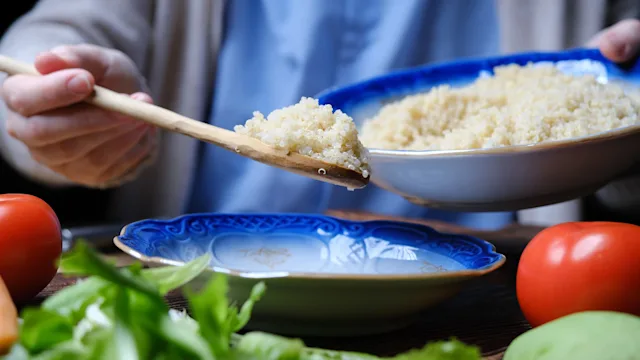Key takeaways:
You can take steps to boost your immune system, but there are no miracle drugs or quick fixes.
The best ways to boost your immune system are to eat healthy food, exercise, and get enough sleep. It’s also important to avoid cigarettes and excessive alcohol.
Many popular myths about boosting the immune system can actually weaken it. Rapid weight loss, high-dose supplements, and intensive exercise can all have a negative impact on your immune system.
COVID-19 and other respiratory viruses have many people wondering if you can quickly boost your immune system. Immune responses are complex and require the coordination of many types of white blood cells, immune proteins, and blood vessels. There’s no quick fix to enhance this process or boost your immune system. But, if you follow some simple guidelines, you can be on the path to a stronger immune system in no time.
Can you actually boost your immune system quickly?
No, you can’t really boost your immune system “quickly.” It takes a little time. The immune system is made up of many different cells and proteins. Each part has to be built from the building blocks available in your body. That’s why there are no quick fixes or miracle supplements to repair a weakened immune system.
But there are things you can do right away to limit your exposure to germs that can make you sick:
Wash your hands. It’s best to use soap and water. Keeping your hands clean can limit the ability of some germs to spread from person to person.
Clean and sanitize your space. Germs are passed around when an infected person handles an object and then someone else picks it up. Since you can’t control whether other people are washing their hands, make sure you keep high-touch areas clean.
Wear a good mask (N-95 or KN-95). This is especially helpful when you’re going to be in a crowded place or potentially exposed to people who might be sick.
What works to enhance your immune system?
There may not be a quick fix, but there are things you can do over time to boost your immunity. The CDC recommends six things that have been proven to enhance the immune system.
1. Eat a healthy diet
Eating a well-balanced diet is important. The immune system gets its building blocks from the food you eat. Colorful fruits and vegetables, whole grains, and lean meats provide the materials for a healthy immune system.
But not everything is good for your immune system. Avoid processed foods — like processed red meats, refined sugar, and saturated fats. These foods can increase inflammation, and that hampers a strong immune response.
2. Get exercise almost every day
Research shows that exercise has an effect on the immune system. There’s evidence that regular, moderate physical activity boosts the immune system. This works for a short time immediately after exercise and over the long term. It can even delay the immune system from aging.
On the other hand, beware of the two extremes. Intense exercise and no exercise at all can both weaken the immune system.
3. Get plenty of sleep
Your immune system is activated while you sleep. During sleep, the body produces a different set of hormones than during wakeful periods. This causes certain immune cells to develop. And it even helps them remember earlier infections. Not getting enough sleep (at least 7 to 9 hours) can:
Increase inflammation
Decrease immune responses
Worsen or lead to chronic disease
Read more like this
Explore these related articles, suggested for readers like you.
4. Avoid excessive alcohol
Alcohol can contribute to many medical conditions. It can even weaken the immune system. Excessive alcohol can damage the lining of the gut and increase inflammation in the body. And this can leave you vulnerable to dangerous bacteria. Too much alcohol can also reduce the number of infection-fighting immune cells.
5. Quit smoking (or don’t start)
Cigarette smoking packs a double punch to the immune system. First of all, it makes it easier for disease-causing germs to invade the body, especially through the lungs. Second, it weakens the body’s ability to fight off infections by damaging white blood cells and increasing inflammation.
If you smoke and would like to quit, resources are available to help. Quitting smoking is one of the best things you can do for your health and your immune system.
6. Maintain a healthy weight
Carrying a significant amount of excess weight can harm the immune system and increase the risk of infections. Having a heavier body weight can lead to inflammation and weaken the immune response. This happens because there are lower numbers of infection-fighting immune cells. And those cells don’t work as efficiently.
5 myths about boosting your immune system
There are many myths and some confusion about boosting the immune system. Some popular myths that aim to boost the immune system can actually weaken it. Let’s take a look at some ideas that may end up being harmful.
Myth 1: If you’re overweight, you should lose weight as quickly as possible to help your immune system
Not true. Excess body fat contributes to inflammation and has been shown to reduce an effective immune response. But losing weight too fast can stress the body and cause its own inflammation. It’s stressful and can deplete the body of immune-boosting nutrients. Maintaining a healthy weight makes the body stronger, gives it proper nutrition, and boosts the immune system in the long run.
Myth 2: Since physical activity is good for the immune system, you should start exercising intensely right away to get in shape and boost immunity
Moderate exercise is good, and it can help to boost immunity. But overly intense exercise can make you more likely to get infections — especially respiratory infections. And if you’re just starting to exercise, you’re at risk of overtraining. This can actually weaken your immune system.
Myth 3: Stress can’t make you sick
Stress can impact your immune system and make you more likely to get sick. Cortisol is a steroid hormone your adrenal glands make in stressful situations. You need cortisol to survive, but too much can have a negative effect on your immune system. In fact, cortisol can directly decrease immune function by reducing the number of white blood cells the body makes.
Myth 4: High doses of supplements like vitamin C can help boost the immune system quickly
Sometimes vitamin supplements can be helpful. Vitamin C might help you get over a respiratory infection faster — but only if you take it regularly. It’s not a quick fix. And it’s not likely to keep you from getting an infection in the first place.
You should always take supplements as directed. Side effects can occur with doses that are higher than the recommended amount. For example, vitamin C hasn’t been shown to be toxic in high doses, but it can cause unpleasant side effects. If you take too much, you may experience diarrhea, nausea, and abdominal pain.
Remember to check with your healthcare provider before starting any new supplement. This is especially true if you’re taking other medications or getting treatment for a medical condition.
Myth 5: Certain foods can boost the immune system quickly
Bright, colorful fruits and vegetables help build a healthy immune system, but this doesn’t happen overnight. Foods that contain the mineral zinc can boost the immune system, too. Zinc-rich foods include:
Beef, chicken, and turkey
Oysters and crab
Beans, nuts, and lentils
Dairy
Fortified cereals
The bottom line
There’s no way to boost your immune system quickly, but you can make some simple changes that will make it stronger. A well-balanced diet, moderate exercise, and quality rest each night can help boost your immune system over time. If you’re concerned about the function of your immune system, talk to your provider. They can help you find ways to enhance your immune system and overall health.

Why trust our experts?


References
Besedovsky, L., et al. (2012). Sleep and immune function. Pflugers Archiv: European Journal of Physiology.
Cardoos, N. (2015). Overtraining syndrome. Current Sports Medicine Reports.
Centers for Disease Control and Prevention. (2021). Six tips to enhance immunity.
De Heredia, F. P., et al. (2012). Obesity, inflammation and the immune system. Proceedings of the Nutrition Society.
Gleeson, M. (2007). Immune function in sport and exercise. Journal of Applied Physiology.
Jones, A. W., et al. (2019). Chapter 15 - Exercise, immunity, and illness. Muscle and Exercise Physiology.
Nieman, D. C., et al. (2019). The compelling link between physical activity and the body’s defense system. Journal of Sport and Health Science.
Thau, L., et al. (2022). Physiology, cortisol. StatPearls.
Viardot, A., et al. (2010). The effects of weight loss and gastric banding on the innate and adaptive immune system in type 2 diabetes and prediabetes. Journal of CLinical Endocrinology & Metabolism.


















